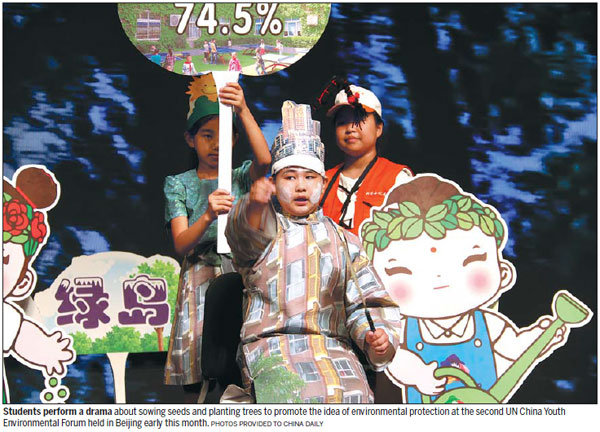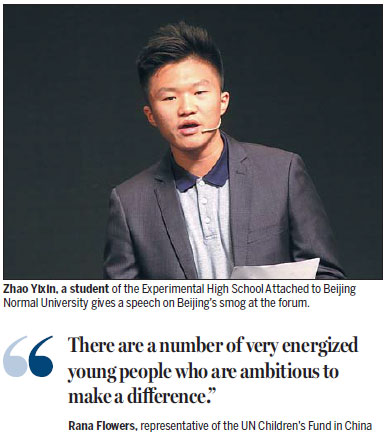UN environment event encourages children to speak up, get involved

Young people from across the country join, create research projects, aiming to leave behind a better world
A 10-year-old boy in a business suit stepped on the stage to display his research results.
Zhou Jiaxu, a pupil at Beijing No 2 Experimental Primary School, addressed his insights at the second United Nations China Youth Environmental Forum held in Beijing in early August. He described his research into using lotus sprouts instead of straws to drink beverages.
With the theme of "sustainable development and our environment", the annual event is open to Chinese primary, middle and high school students to publicize the environmental-related projects they have undertaken.

Zhou visited several supermarkets and stores to investigate the sale and usage of plastic straws, distributed questionnaires to gauge public opinion on using such straws and tried out different possible materials, such as celery and water spinach, to test their stability and resilience.
"As Chinese teenagers, we have our own thoughts and innovation, and I think we should care more about sustainable development and the environment."
Pradeep Monga, deputy executive secretary-general of the United Nations Convention to Combat Desertification said young people can play an important role in environmental protection because they are future leaders.
"As adults, we should raise their awareness about global issues, provide them with full information, and let them know the influences on their lives. For example, if there is desertification in China, we need to tell them how it can affect Beijing," he said.
Zhao Yixin, a student of the Experimental High School Attached to Beijing Normal University, said he used to think environmental protection was not connected to his life, until one day he found the smog in Beijing blocked him from playing basketball.
"During such days, we had to be trapped indoors. And I began to realize the environment is part of us," he said.
He said he often attended environmental protection events, including planting trees and trash management activities with his friends.
"But that is more than enough," he said. "As the post-2000 generation, we have rich educational resources and we need to dig deep into the origin of problems."
He said he once hated the steel factories, which were ordered to close, were still working to generate more smog. But when his families drove through the poor counties of northern Hebei province, he realized their damage to the environment was because it was the only way to make a living.
Zhao said the environment was often neglected when it comes to economic development in some regions, but the two were not necessarily contradictory.
In his research on how international investment affects corporate culture, he found some overseas projects would require the companies to adjust its management system to adapt to the local laws and standards, including those involving environmental protection.
"When the changes accumulate, a new atmosphere will appear in the market," he said.
Inspiring kids nationally
The annual event is held by the UN Environment Programme, China Daily and the Center of Environmental Education and Communications of the Ministry of Environmental Protection.
Sub-forums have been held in cities including Beijing, Shanghai, Xiamen in Fujian province and Guangzhou in Guangdong province since June to select 23 teams among about 1,000 candidates for the final contest in Beijing.
Rana Flowers, representative of the UN Children's Fund in China, said the forum brings together children with accurate factual information and looks for the roles that they can play in environmental protection.
"There are a number of very energized young people who are ambitious to make a difference. It depends on the use of their voice so that they can be able to influence their families, their schools and communities."
A team of three students from Beijing No 8 High School said at the forum that during their scientific tour of Wuhai in the Inner Mongolia autonomous region last year, they put forward ideas to tackle the local desertification by planting a shrub called reaumuria songarica maxim.
They studied local vegetation characteristics, compared the influence of geological localization on the growth of plants and the feasibility and potential economic effects of introducing the new plant, in their research paper.
He Shitu, one of the team members, said many of their classmates were interested in the topic and often asked questions about their paper.
Attendees joined the final contest at the Environment Youth Leadership Camp from Aug 2-3, while they took training sessions about environmental issues such as food wastage, marine environmental protection and water resources, as well as skills-based classes covering leadership and communication.
Some finalists will have the chance to attend a camp in the Kubuqi desert in Ordos, Inner Mongolia or a camp about sustainable cities in Germany, according to Jiang Nanqing, national program officer of the UN Environment Programme.
"We hope to organize an interesting activity which is different from school education, while students can speak out their own ideas and make innovation on their own," she said.
Pradeep Monga said: "The youth need to know they can change the circumstances by doing little things, like recycling, reduction and reusing of resources. They can have very good ideas, and adults should listen to them and also empower them."
chenmeiling@chinadaily.com.cn


















